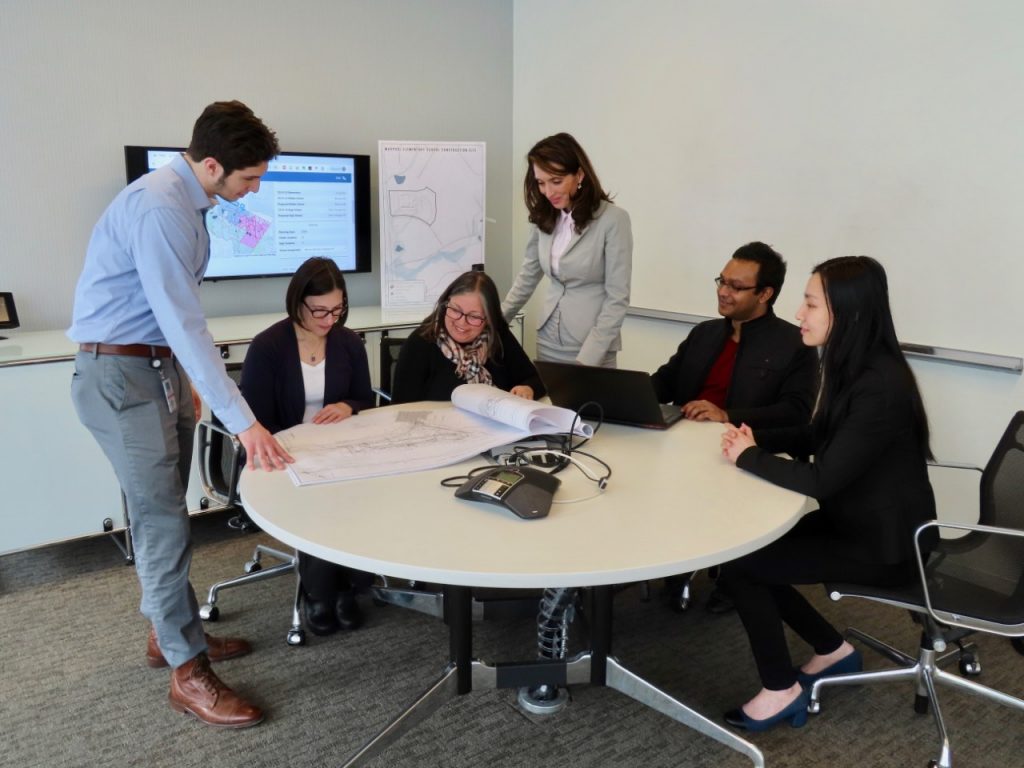UrbComp program team receives Alumni Award for Outreach Excellence

A multidisciplinary faculty team has garnered the Virginia Tech 2021 Alumni Award for Outreach Excellence for developing and administering the Urban Computing (UrbComp) program that trains graduate students in the latest methods of analyzing massive datasets to study key issues facing urban populations while emphasizing ethical and societal issues for practicing responsible data science.
The award, announced today by the university, accompanied by a $2,000 monetary award, is funded through the university’s Alumni Association and managed and administered by the Commission on Outreach and International Affairs.
The 24-member UrbComp team is led by Naren Ramakrishnan, the Thomas L. Phillips Professor of Engineering in the Department of Computer Science at Virginia Tech and director of the Sanghani Center for Artificial Intelligence and Data Analytics. Wanawsha Shalaby serves as UrbComp program coordinator.
Team faculty members represent 11 different departments who are either teaching an UrbComp course, advising an UrbComp student, or engaging in UrbComp related projects. They are: co-PIs Layne T. Watson, CS; Leanna House, STAT; Mark Embree, MATH; David Bieri, UAP; and the late John Ryan, SOC; contributing faculty Saifur Rahman, ECE; Kimberly Ellis, ISE; Ryan Gerdes, ECE; James Hawdon, SOC; Robert Hildebrand, ISE; Mike Horning, COMM; Eric Jacques, ECE; Scotland Leman, STAT; Chang-Tien Lu, CS; Brian Mayer, CS; Klaus Moeltner, AAEC; Chris North, CS; Hesham Rakha, CEE; Chandan Reddy, CS; Tom Sanchez, UAP; Nathan Self, CS; and Pablo Tarazaga, ME.
A major component of the UrbComp program — initially funded in 2015 by a five-year grant from the National Science Foundation’s Research Traineeship program — is outreach to industry, government, and the nonprofit sector, fostering collaborations that are beneficial both to students who gain real world experience and partners who can use data to make better decisions for their communities. Following are examples of such collaborations:
- Loudoun County Public Schools (LCPS): School rezoning decisions often cause emotional stress for families and communities for a variety of reasons. Parents worry about continuity of programs and activities at a new school, the toll it might take on their children’s friendships, and modes of transportation. School officials, administrators, and staff want to ensure that all students have equitable access to educational programs and facilities. UrbComp has partnered with LCPS to tackle the issue of redrawing school attendance zones, designing Redistrict, an online interactive platform that tries to reduce stress by getting parents and other stakeholders more involved in the process. Since working with UrbComp, LCPS has established three new school attendance zones including Goshen Post and Waxpool Elementary Schools, which opened in Fall 2018 and 2019 respectively, as well as Lightridge High School, which opened in Fall of 2020.
- World Wildlife Fund (WWF): UrbComp partnered with the WWF on one of the organization’s important issues, illegal logging and trade, often the first links in a chain of events that cause forest degradation, using — for the first time — an automated data analytics system to help identify suspicious timber trade records that relate to possible illegal activity. The human-machine approach developed for this innovative system will help flag suspicious timber at the border in real time, improving both efficiency and effectiveness. UrbComp students presented a paper on their work for this project at the Annual Conference on Innovative Applications of Artificial Intelligence, a collocated program of the Association for the Advancement of Artificial Intelligence conference held in New York City in February, 2020.
- Washington Metropolitan Area Transit Authority (WMATA): The UrbComp program has collaborated with WMATA on five different projects. Four of these projects were course projects for UrbComp students who helped WMATA predict its system’s on-time performance (OTP); developed a methodology for assessing delays in the bus system by applying big data structure and statistical analysis to the data constantly collected by WMATA buses; created a model to predict ridership impacts on mass transit with artificial intelligence; and leveraged Twitter data for early detection of metro service disruptions and proposed the Metro Disruption Detection Model, which captures semantic similarities between transit lines in the underlying social media space. The latter has grown into a fifth sponsored project to further develop a deployable open-source system that detects criminal acts in real-time.
UrbComp is open to all graduate students at Virginia Tech and provides multiple avenues of engaging and participating in the program. Students can participate through the Graduate Certificate in Urban Computing, approved in 2017, and the two courses developed for this certificate (Intro to Urban Computing and Ethics and Professionalism in Computer Science).
Students can also engage in the program by attending any of multiple events organized by UrbComp, including the bi-weekly UrbComp Seminar Series, faculty and student retreats, workshops, and various networking events.
To date, 216 graduate students across 18 departments at Virginia Tech have been impacted by the UrbComp program and 20 UrbComp graduates (19 Ph.D.’s and one master’s degree) have gone on to jobs within industry, government and academia. Alumni have continued to participate and engage with the program long after graduating from Virginia Tech, returning to participate in UrbComp events, specifically as guest speakers in the bi-weekly UrbComp Seminar Series where they share their experiences in the program and how UrbComp has played a part in their professional careers.
For more information on UrbComp, contact the program coordinator, Wanawsha Shalaby